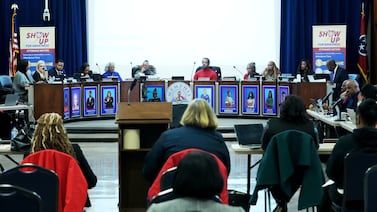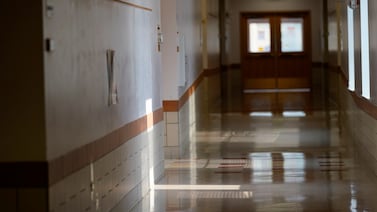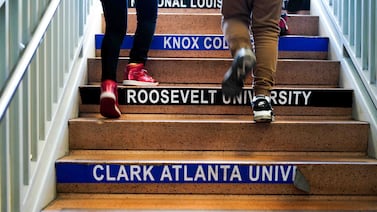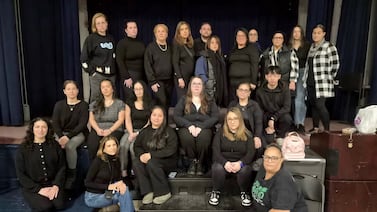Sign up for Chalkbeat Chicago’s free daily newsletter to keep up with the latest education news.
A child tax credit for Illinois families, funding for free school meals, and support for districts enrolling migrant students are some of the key issues to watch during this year’s spring legislative session.
State lawmakers headed back to Springfield for the start of the session on Jan. 16 to file hundreds of bills, start committee hearings, and negotiate over the state’s fiscal year 2025 budget. Legislators plan to wrap up the session at the end of May, with the new budget set to go into effect July 1, 2024.
Chalkbeat Chicago is keeping an eye on the debate over the Chicago elected school board maps, since the legislature has until April 1 to finalize the voting districts. November will be the first time that Chicago residents can vote for school board members, after years of the board under mayoral control.
In addition to the elected school board maps bill, here are five other education issues we will be watching:
Funding for migrant students
Chicago Public Schools and suburban school districts have been scrambling to support migrant students. Chicago announced earlier this month that 5,700 newly arrived students have enrolled in the school district since the beginning of the year.
Last week, Gov. J.B. Pritzker and Cook County Board President Toni Preckwinkle announced they were partnering to provide $250 million to help migrants receive shelter, wraparound services, and health care.
“With thousands of asylum seekers continuing to come to Chicago in desperate need of support and with Congress continuing to refuse to act — it is clear the state, county, and the city will have to do more to keep people safe,” Pritzker said in a press release.
A spokesperson for the governor said the funding is not for schools.
State lawmakers have not yet filed a bill this session to help schools support migrant students with additional funding. Rep. Fred Crespo — who represents Chicago’s northwest suburbs — filed the “New Arrivals Grant” bill last year that would have allocated $35 million to schools, but it did not move past committee.
A child tax credit for Illinois families
Illinois lawmakers have proposed a bill to create a statewide tax credit for families. Senate Bill 3329 and House Bill 4917 would allow families to receive up to $300 per child for children under 17. Married couples who make less than $75,000 and single people who make less than $50,000 would receive the additional financial support.
This comes a couple of years after the federal government’s expanded child tax credit ended. In 2021, families received monthly payments of up to $300 per child for children under 6 and $250 for children between the ages of 6 to 17 as part of the Biden administration’s American Rescue Plan.
Some families reported using the funding for groceries and educational expenses. At the time, initial research found the money helped to reduce child poverty and help families feed their children.
Now states around the country have either created a child tax credit or expanded benefits for families. If the general assembly passes a child tax credit, Illinois will be the 15th state to create a statewide child tax credit.
State license pathway for Montessori teachers
Illinois lawmakers, parents, and educators hope new legislation will require the state to recognize Montessori teaching credentials as another pathway to state licensure.
Under House Bill 4572 and Senate Bill 2689, the state would create the Montessori Educator Licensure, which would grant a state teaching license to educators who have graduated from a college or university with a bachelor’s degree, received a credential from an institution accredited by the Montessori Accreditation Council for Teacher Education, the American Montessori Society, or the Association Montessori Internationale, and completed state licensure testing.
Reena Vohra Morgan, board president for the Association of Illinois Montessori Schools, spoke in support of the legislation during the State Board of Education meeting last Thursday.
“With the teacher shortage as it is, I believe we’re doing a huge disservice to our communities to not have a more streamlined pathway for Montessori credentialed teachers to enter into the public sector with a teacher licensure or pathway to recognize Montessori teaching licensure as a state recognized licensure,” said Vohra Morgan.
Chicago Public Schools has five schools with Montessori programs: Drummond, Suder, Oscar Mayer Clissold, and The Montessori school of Englewood. A total of eight more public Montessori schools are located throughout the state, according to the Association of Illinois Montessori Schools.
New department for early childhood education
In October, Pritzker announced plans to create a new department to house early childhood education.
To make this department a reality, state lawmakers have filed House Bill 5451 and Senate Bill 3777, which would start operations of the department on July 1, 2024. By July 1, 2026, the department would be the lead agency in charge of funding for preschools, licensing for child care programs, home-visiting services, early intervention services for students with disabilities, and other early childhood education and care programs.
For years, early childhood education services were administered by the state’s department of human services, the State Board of Education, and the state’s department of child and family services.
However, it is unclear how large the new department will be and how much funding would be allocated to it.
Funding for free school meals
In August, Pritzker signed a law creating the “Healthy School Meals for All program” to help school districts across the state pay for the cost of school meals for all students. However, the bill did not allocate additional funding to schools to help pay for the program.
Illinois advocates are pushing the state to allocate $209 million in the fiscal year 2025 budget to help school districts provide breakfast and lunch for students. Illinois lawmakers Rep. Maurice West, a Democrat representing Rockford, and Sen. Laura Ellman, a Democrat representing Chicago suburb Naperville, have filed appropriation bills. West sponsored the “Health School Meals For All program” law last session.
During pandemic-related school closures, the federal government gave school districts waivers to provide free meals to all students, provided flexibility on what is served to students, and allowed students to pick up meals and take them home. But the waivers lapsed at the end of June 2022, and Illinois school districts again required families to explain why they needed subsidized school meals.
Correction: Feb. 21, 2024: This article has been updated to reflect that individuals who want a Montessori Education License can go to an institution accredited by Montessori Accreditation Council for Teacher Education, the American Montessori Society, or the Association Montessori Internationale, not necessarily an institution of higher education.
Samantha Smylie is the state education reporter for Chalkbeat Chicago, covering school districts across the state, legislation, special education, and the state board of education. Contact Samantha at ssmylie@chalkbeat.org.






